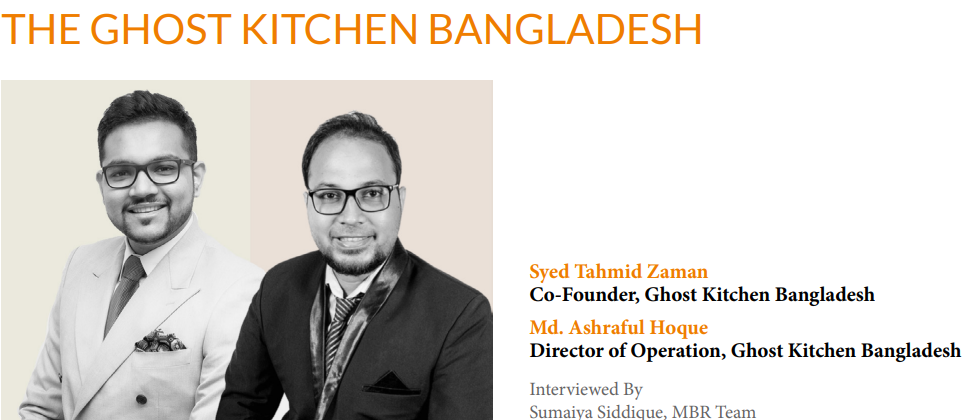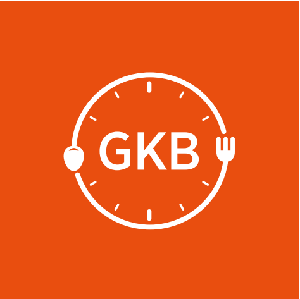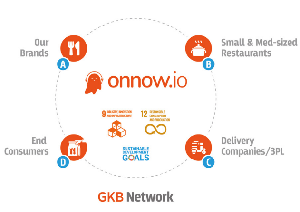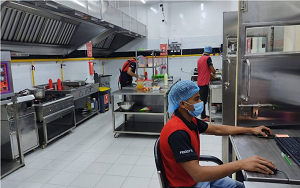
THE GHOST KITCHEN BANGLADESH
Interviewed By Sumaiya Siddique, MBR Team
MBR: What prompted you to come up with the initiative of Ghost Kitchen Bangladesh (GKB)?
GKB: GKB has an interesting story behind its formation. So, back in 2019, one evening, I was casually chatting with two of my friends at a local burger joint. While having burgers, we were just discussing the prospect of setting up a delivery-only burger joint where we will save significant operational costs related to dine-in space including waiting staff wages. It was an insignificant arbitrary discussion. But after coming home, I was still musing about the concept.
On impulse, I designed the logo for a hypothetical brand called Friggy’s, and being an enthusiastic graphics designer, I couldn’t resist myself to design the packaging too.
Lastly, after picking up a few menu items for the brand, I called it a night. Truly, I had no plan to go further with the idea of Friggy’s.
A few months later, I traveled to Canada and found out about an early-stage cloud kitchen company named ‘Ghost Kitchen Brands’ based in Toronto. Curiously, I got in touch with the company’s founder on LinkedIn and asked if I might come over and take a peek. The founder was very welcoming, and he invited me to his kitchen. That’s how I learned about the complexities of a cloud kitchen - it should house multiple brands; should be tech-driven, and it must be effective in terms of stock and supply chain management.
After seeing and understanding how this sector is booming in the West, I decided to build a cloud kitchen venture in Bangladesh - little did I know, we will take a 360 degree turn in a few months. In March 2020, I pitched the thought of setting up a multi-brand cloud kitchens to a group of investors, secured the pre-seed funding, and incorporated our startup as Ghost Kitchen Bangladesh Limited. Apart from investor funding, I had bootstrapped as well.
I am fortunate to have Md. Ashraful Hoque Chayon as my co-founder and Operations Director at GKB. Back in 2019, I had shared the thought with Chayon Bhai as well. But back at that point, I was considering it as a single brand. After securing the investment, I reached out to Chayon Bhai again and passed on the thought of making a multi-brand cloud kitchen, with each kitchen utilizing the same basic elements and being completely automated.
He instantly agreed to come on board. This is how GKB officially started its journey with its first brand Friggy’s in June 2020.
Having said so, it’s very interesting how over the course of just a few months since our inception, we as a startup have evolved so much. Starting just as a multiple cloud kitchen company, to a KaaS (Kitchen-as-a Service) operator, we have gone through it all. After months of trial and error, now we have a hyper-focus, and call ourselves a tech-enabled internet restaurant (or cloud kitchen) platform that utilizes technology, virtual menu concepts, digital branding and training to help existing restaurants unleash their ‘cloud’ potential and drive additional revenues while improving their bottom-line. You see, how we started, and what we have become today, is completely different.

MBR: Could you kindly give us a tour of the services you offer and how you offer them?
GKB: GKB is no longer just a cloud kitchen company. Rather it is a food-tech company, where we empower small and medium-sized restaurants with virtual menu concepts or virtual brands, technology, and food safety training.
We build unique cuisine-focused delivery-only brands targeting the market and customer base, and these brands do not have physical dedicated restaurants as well – they operate in the cloud. GKB is responsible for researching, creating, and advertising these brands utilizing digitals mediums.
To be concise, in this B2B (business to business) model, we provide our restaurant partners who subscribe to the brand with the brand’s menu, recipe, and food ingredients. After that, the restaurant themselves produce as per our guideline and sell the final products. This way restaurants can generate extra income on the side of their current revenue.

Our brands are popular enough. So, the restaurants are encouraged to proceed with this business model to increase their revenue.
Just to clarify, every restaurant partner will continue having its existing menu and continue their regular operations, but GKB will add something extra on
the top. This business model aids small and medium restaurants that are struggling to stay afloat owing to strong competition, particularly from large chains, who benefit from having a well-known brand, lower operating costs, holding bigger marketing budgets, and easy access to better technology.
Any SME restaurant, fast food shop, or cafe can subscribe to our food franchises, benefit from our branding and technology, and increase revenue while also improving kitchen operations with our advanced tech platform, Onnow - a revolutionary all-in-one restaurant management platform that our partners
can use ‘for free’ and take control of their restaurant’s supply-chain, online order management, and more.
MBR: There must be certain challenges you faced while bringing GKB into existence. Could you please share major challenges and also the story of how GKB is overcoming those challenges?
GKB: Since our inception last year, we have explored multiple verticals, experimented significantly and obviously made mistakes. After all these months, we
have finally developed a model which is both capex and opex friendly and one that can be scaled nationwide and beyond borders. Incorporating the business and building a cloud kitchen was relatively easy for us owing to my previous experience of co-founding Best Electronics where we had opened 120+ outlets nationwide in just 5 years. Having said so, GKB, being a startup, was a totally different story. Startups are required to scale exponentially where a tech-enabled system has to be in place to grow at an accelerated pace with incremental capital. In the first 8 months of operations, we struggled to build a business which had a compelling nationwide scale strategy. Hence, after numerous meetings with foreign VCs, and evaluating their feedback and
suggestions, we decided to stop what we were doing, went back to the drawing board and found a massive problem which can be solved using technology. The 8 months of direct exposure to this sector helped us identify some core issues in this sector which mainly resulted in the failure of small and medium-sized restaurants. Hence, we decided to use our existing resources to pivot into a new business model with a vision of empowering 60,000+ SME restaurants by solving those core problems using technology.
MBR: The lockdown due to the ongoing pandemic has put the restaurant industry in a unfavorable situation. How has the pandemic affected GKB’s services and how is GKB navigating through this?
GKB: There are currently about 60,000 restaurants across the country, with more than 8,000 in the capital alone. Close to 2.8 million people are dependent on the restaurant industry for their livelihoods, while the number is several times higher if it includes the supportive sectors. Trouble began after the outbreak of Covid-19 last year. A number of restaurants beganletting go of staff while many sold off their business. Some were unable to survive and closed shop entirely.
This is exactly why GKB exists. We are here to help these restaurants survive by giving them access to our resources. We already have 15 restaurant partners in the pipeline who will go through intensive training and start producing our brands.
MBR: Could you please share the broader vision of GKB with us?
GKB: We do believe that we have cracked a scalable business model through which we can become the largest internet restaurant platform, not only in
Bangladesh but in the whole world. SME restaurants, especially in developing countries are facing similar challenges like the ones in Bangladesh, and we have already seen the impact that we are driving in this sector. For example, one of our partners in Banasree already has an ARR of $15,000+ from just one of our brands, Wrappo. We have already started to build resources in India through which we plan to enter Kolkata market near the end of 2022.


The Local Textile Industry of Bangladesh: A Signature of Our Culture
The Local Textile Industry of Bangladesh: A Signature of Our Culture
Clothing is one of the basic needs of human life for survival that comes after food but it is more than an essential requirement as it represents the uniqueness
and identity of a nation. We have represented our heritage in the global stage through Jamdani and Moslin. With passage of time, our concentration moved
towards the RMG and we, through leveraging our competitive advantage of low cost production, have secured the third position in the world.
Although it is very common to associate the RMG sector with local textile industry, RMG is different from local textile. RMG sector is engaged in manufacturing
export oriented products while the local textile holds the aim to serve the native demand.
The local textile has to go through five distinctive steps to produce the finished goods. The process starts from import of cotton, and then we move to spinning which means the production of yarn. After producing yarn we move to the next step and it is weaving where grey fabrics are produced. Then we move to the fourth step where grey fabrics move into dyeing and printing factories and finally, we step into the final stair and it is the finished goods.
The size of local textile industry is immense and its market size is of USD 7 billion dollar. Although there is a trend of duplicating the design of neighboring
countries but our local brands, for example: Yellow, Sailor, Aarong, etc. are promising and we hope that in the near future we will cater our domestic market with own distinctiveness.
Nothing is beyond challenges and limitations, and our local textile industry also has certain challenges which range from scarcity of investment to reform of existing policies. Yet, we can see a prospective future of this sector, and proper nurture of this segment will let us set our footprint in abroad as well, after fulfilling the domestic demand.
RIFAT ISHTIAQ KHAN
Manager
IDLC Finance Ltd.